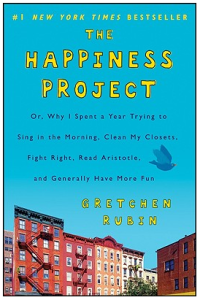 “We hold these truths to be self-evident, that all [people] are created equal, that they are endowed by their Creator with certain unalienable Rights, that among these are Life, Liberty and the pursuit of Happiness.”
“We hold these truths to be self-evident, that all [people] are created equal, that they are endowed by their Creator with certain unalienable Rights, that among these are Life, Liberty and the pursuit of Happiness.”
The Declaration of Independence, In Congress,
July 4, 1776
Here in the U.S., as we celebrate our independence and reflect upon how much progress we’ve made this year and how much more we have to go as a nation, it’s also helpful to pay attention to our individual pursuits of happiness. Gretchen Rubin’s thoughtful, humorous, and action-oriented book, The Happiness Project, is a great place to start.
Some people may question whether, in the face of so much suffering around us, if the pursuit of our personal happiness is important. To address this, Ms. Rubin often comes back to the question of why someone like her, who has so much and is basically happy, should take on a happiness project. She wonders, can she be happier and can she prepare herself, emotionally, for that dreaded time in the future when things might not be going so well and happiness may be much more elusive? She is not in the grip of crisis and she writes, “I didn’t want to wait for a crisis to remake my life.” (page 15). I think this is true for many of us, we don’t need to wait for a crisis to start focusing on our happiness. AND, our personal happiness matters.
It matters for at least three reasons:
- When you feel happy you can do your best work and fulfill your life’s purpose.
- When you’re happy, you can help others and assist them in their pursuit of happiness.
- Happiness is contagious. (Relates to point number 2.)
Hopefully, you’re convinced that your personal happiness is a top priority in your life. This doesn’t mean it’s a narcissistic pursuit. We’re talking here about healthy personal fulfillment. Ms. Rubin outlines many, many approaches in her book. A former lawyer, she is methodical in her approach to her happiness project and has done extensive research on the different ways that people have used to achieve this ultimate state of well-being. Let’s look at a few of those approaches.
One of things that struck me throughout her book was the impact of small changes. Some of the small changes that she made included, the “evening tidy-up” which for her proved to be a way to maintain her workspace and home in a way that she found pleasing. She also revels in the cleaning out of a closet — so much so that it is a gift that she offers to do for her friends. (Of course, those who are open to it.) This sharing with friends and family is also a foundational aspect of the book. Ms. Rubin notes how a sunny attitude and a cheerful review can boost one’s mood and those around her. She also does an amazing job (one that I really admire) of not just thinking about doing a kind act for another person, but actually following through and buying a gift or providing that helping hand.
Small changes and the positive contagion of emotion are themes throughout the book, but she notes the one thing that she did that had the largest and most sustainable impact, was her Resolutions Chart. (You can find a copy of the chart to download here.) The resolutions are broken down by month which is a great approach. Rather than taking on everything all at once, she focuses on a particular area of her life, let’s say, “family,” for one month, has specific resolutions around that topic and then can review her progress at the end of the month. From there she can determine what she wants to continue in that arena.
As I read the book, there were a few resolutions that really stood out for me and I have been incorporating into my daily life. For instance, she has one called, “Be Gretchen,” which I have incorporated as just, “Be me.” A couple of others that have been helpful include, “Tackle nagging tasks” and “Don’t nag.” For me, tackling nagging tasks has been really liberating because I found there is enormous mental energy and emotional criticism that lingers inside myself with those tasks that never seem to get done. (Getting the appropriate help to complete those tasks is also crucial for success. There is usually a reason that they’re not done. Maybe they’re too hard, maybe you don’t know how to complete them, or maybe you don’t wanna!) Also, the avoidance of nagging and, for me, the avoidance of arguing, have been helpful. When I catch myself going there, I try to re-frame my words so that they are kind, motivating, and come from a place of love — definitely more happiness promoting than nagging or arguing!
What about you? Have you engaged in a happiness project? What are your top tips for promoting happiness in your life and those around you? Please share your thoughts in the comments below!
Wishing you an abundance of freedom and success in your pursuit of happiness!


Sounds like a good read, I shall add it to the ever growing list 🙂
Hope you enjoy it when you have the time to read it! I have quite the pile of books to read as well! 🙂